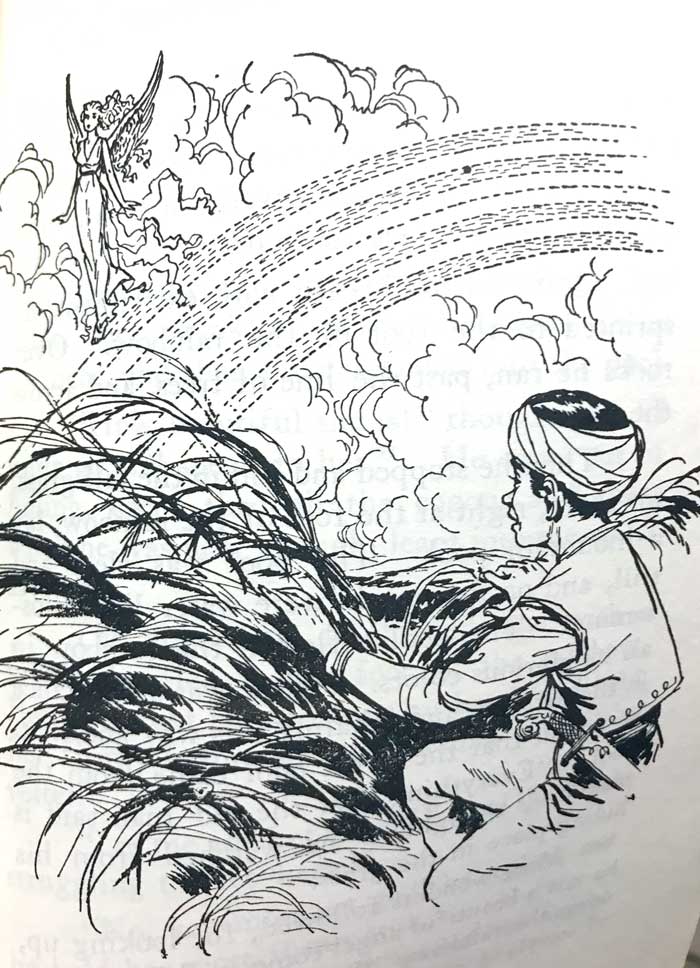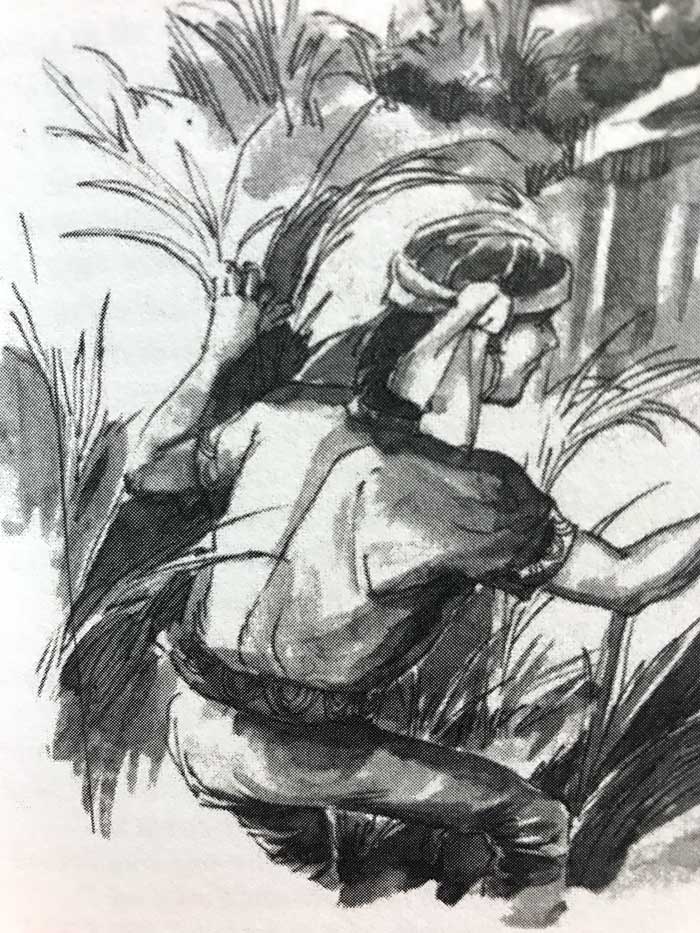The Biraddali is a fascinating belief, and the term is rarely heard in the documented Philippine folklore regarding it. The main reason for this is that biraddali is a regional term to describe a type of “angel.” When these tales are translated into other languages (English or Tagalog), the term is almost always replaced with “angel,” “skymaiden,” or “heavenly-being.” I credit Jean Karl Gaverza from Philippine Spirits for first correcting this in his fictional tale “The Seven Biraddali Sisters.”

The beliefs surrounding the biraddali seem to be a blending with Islamic concepts and ideas, although the tales do share very similar story structures to ‘skymaiden’ narratives from the neighbouring indigenous people of Mindanao.
Essentially, the Biraddali , or angels , live high up in the sky and probably none of us have ever seen them. It is believed that these angels are beautiful, much more so than any woman living on the earth. They have wings and can take them off. It is also said that the biraddali become the wives of the holy men if the holy men die in battle. [1]
Biraddali or bidaddari likely comes from the sanskrit ‘widjadari’ meaning “angel or houri.”[2] In Islamic religious belief, houris are women who will accompany faithful Muslim believers in Paradise.
On Tawi-Tawi (Bangsamoro Autonomous Region in Muslim Mindanao), a set of mini water falls have been given the name Biraddali (Rainbow Angel) Mini-Falls.

In 1957, Maximo Ramos published a collection of Philippine Myths & Tales. In it, he shared a story called “The Bridge of the Angels.” Only once did he use the term birad-dali, and it was to explain his use of the term “angel” throughout the story. I am sharing the tale below but have replaced the word angel with biraddali as it was meant to be.
The Bridge of the Angels (biraddali)
ONE DAY a young datu was standing on a mountainside. The sun shone over the valley, and he looked up to behold a rainbow forming in the sky. He saw one end of the rainbow bend toward the mountain on which he stood admiring its perfect shape and its bright colors.
Then he remembered an old story he once heard about the rainbow. A white-haired old man had said that the rainbow was the bridge which the biraddalis (‘angels’) took whenever they came down to earth. “That is why one foot of the rainbow often rests on the side of a mountain,” the man had said, adding: “Now if you run fast and get to the foot of the rainbow quick enough, you will find a fragrant pool there. Hide yourself and watch quietly, and you will see the biraddalis— come down to bathe in the pool.”
The young datu watched the foot of the rainbow bend lower and lower. Soon it almost touched the tops of the trees that stood in a line winding down the mountainside. Then the rainbow swung away beyond the trees, and its foot descended further until it rested in a cogon patch well within running distance from where he stood.

Quite out of breath with excitement, he sprinted to the foot of the rainbow. Over rocks he ran, past a line of trees, and across the cogon grass.
Then he stopped and hid in the tall grass, for there, right at the foot of the rainbow, lay a mountain pool. The pool was clear and still, and on its margin were water lilies in bloom. The pool reflected the rainbow in all its glorious colors. There was a fragrance in the air, too, and inhaling this way and that, he found that the sweet odor came from the pool. “Everything the old man said is true!” he thought, watching from his hiding place in the grass.
More wonders followed, for looking up, he saw a beautiful biraddali come walking lightly down the rainbow. She resembled a princess of storyland coming down a palace stairway. She cast her glance here and there, and the young man could see that she was trying to make sure nobody was around.
But as I said before, he sat hidden in the tall grass, so the biraddali did not see him. Gracefully she alighted from the rainbow, her white feet twinkling above the water for a moment, and then she descended into the pool.
“How beautiful she is!” thought he. “I must go and speak to her.” He came out of hiding, crept through the reeds, and then, when near enough, leapt into the water after her.
The biraddali was frightened, and with a splash she fled to the foot of the rainbow. But he caught her wrists in his hands and held her firmly before she could climb out of the water.
“Let me go! Let me go!” cried the biraddali , struggling to free herself.
“Please let me go!” wailed the biraddali . “Let me go!”
“If you return to heaven,” said he, “I can never hope to see you again. You must come home with me and be my bride.”
“I have promised to marry a hero,” sobbed the biraddali . “He died in a great battle of men only yesterday. I must go back to heaven. Let me go!”
“No, you must remain on earth with me,” said he firmly.
Again the biraddali struggled to get free but he held her in his arms. “Oh, what shall I do!” she moaned.
“Life on earth is happy and interesting if one knows how to make it so,” he told her. “If you agree to be my wife and live with me, you will become a mortal. But I will make you the happiest of mortals in all the world.”
The biraddali was finally persuaded and he took her home with him.
When the people saw her, “How charming she is!” they all exclaimed. “Where did you find such a lovely princess?”
He told them his story, and the people wondered at her beauty all the more.
There followed a very merry wedding feast for her and the young datu, and after that, you may be sure they lived happily and virtuously all their earthly lives.
As to what happened after they died, I am sorry I cannot say, and the old men of Sulu who tell this story cannot say either. But since they lived so happily and so virtuously, I have no doubt that they went to heaven, where together they must have continued living their sweet and virtuous lives forever.
SOURCES:
[1] Men of the Sulu Sea, Helen Thomas Follett, C. Scribner’s sons (1945)
[2] Sulu Studies 3, A Didactic Ballad on Marriage as Sung by Indah Annura Translated and annotated by Irene Hassan and Ricardo Adjawie (1974)
Philippine Myths, Legends, and Folktales, Maximo Ramos, Phoenix Publishing (1990)
Jordan Clark is a Canadian born descendant of Scottish immigrants living on the homelands of the Lekwungen speaking peoples. His interest in Philippine myth and folklore began in 2004. Finding it difficult to track down resources on the topic, he founded The Aswang Project in 2006. Shortly after, he embarked on a 5 year journey, along with producing partner Cheryl Anne del Rosario, to make the 2011 feature length documentary THE ASWANG PHENOMENON – an exploration of the aswang myth and its effects on Philippine society. In 2015 he directed “The Creatures of Philippine Mythology” web-series, which features 3 folkloric beings from the Philippines – the TIKBALANG, KAPRE and BAKUNAWA. Episodes are available to watch on YouTube. Jordan recently oversaw the editing for the English language release of Ferdinand Blumentritt’s DICCIONARIO MITOLÓGICO DE FILIPINAS (Dictionary of Philippine Mythology) and is working on two more releases with fellow creators scheduled for release later this year. When his nose isn’t in a book, he spends time with his amazing Filipina wife of 20 years and their smart and wonderful teenaged daughter.


